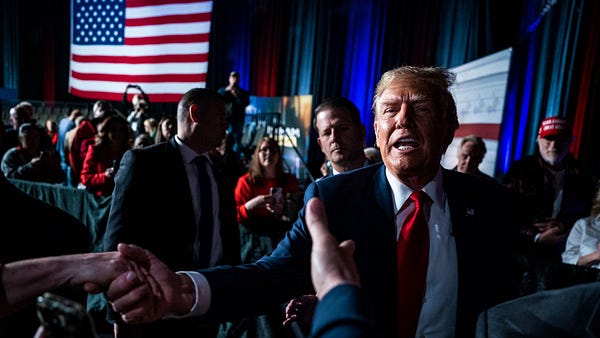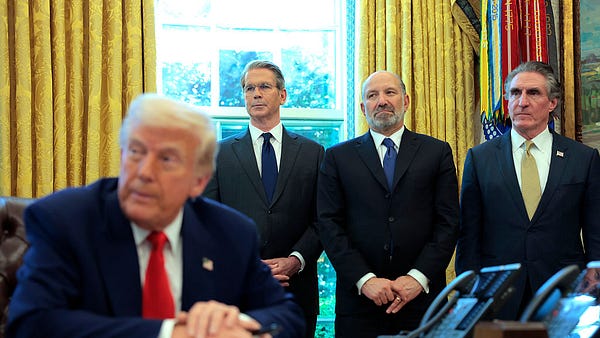
The Free Press

“Picture this: it’s programmable money, available everywhere the internet is. It moves power from unaccountable banks and governments to regular people, on a purely opt-in basis. It builds on cryptography and requires enough fiddly engineering to be catnip to geeks. And if you get in early on it, it will make you fantastically rich.”
I heard that pitch for crypto back in 2010. It was still early days in Bitcoin’s adoption curve, but the initial advocates were mostly people like me, freaks and geeks at the internet’s economic margins. (I sold a few software businesses, worked in financial technology, and now write about financial infrastructure while on semi-sabbatical from real work.)
Did I buy the pitch? No. I took a very close look and saw what I’d eventually describe as “a wonderful engineering achievement: a spontaneously organized, decentralized, peer-to-peer boiler room from which arises a mediocre transaction processing network.”
I’ve endured good-natured jibes from dear friends who got rich betting on crypto. And with crypto having taken a big hit, FTX’s collapse, and its founder Sam Bankman-Fried now on trial for fraud, you’d think I’d be more inclined to say “Told you so” to some of the smartest people I know, who asked me many times over a decade what I got wrong.
My answer is this: I very much did underrate crypto.
It was a program. It was a joke. It was a meme. It was a community. It was an ecosystem. It was a social movement. It wore many masks, and it adopted and just as quickly discarded many pitches. They were ludicrous; they were mutually contradictory; they didn’t matter at all. And then—slowly and then suddenly—crypto ascended to the heights of institutional power.
Tens of billions of dollars had been invested into building an alternate financial ecosystem. Crypto had a notional market cap over $2 trillion dollars. Crypto moguls lectured Congress on the things that the fuddy-duddies in “TradFi” (traditional finance) were getting wrong. Crypto was name-checked by famous rappers, plastered on stadiums, and onstage at conferences, with SBF sandwiched between Clintons and Blairs.
So what changed about the boiler room and mediocre transaction processing network?
Not much.
Sam Bankman-Fried became the poster child for crypto’s march to legitimacy in the United States. He had rocketed out of obscurity, become one of the richest men in the world in only four years, and aggressively attempted to exchange wealth for power. He spent $40 million in the 2022 election cycle, behind only George Soros and Michael Bloomberg on his side of the aisle, and his representatives worked the other side of the aisle too. Whispers in the corridors of power named him the kingmaker in waiting: born into the right circles (to Stanford professors steeped in politics), wealthy beyond the dreams of avarice, and fanatically devoted to turning that wealth into concrete electoral and policy victories.
In November 2022, after a long year of crypto shenanigans, Bankman-Fried’s empire completely collapsed in the course of a week. It turned out that FTX, the crypto exchange that he ran, had transferred billions of dollars of user assets to Alameda Research, the hedge fund that he owned. But Alameda didn’t have the money anymore. It had been gambled away, spent, or otherwise lost. The hole exceeded $8 billion. Bankman-Fried is now on trial for wire fraud, conspiracy to commit money laundering, and other crimes. Four of his top lieutenants have pleaded guilty.
Two books published this week coincide with the start of SBF’s trial, and each attempt to make sense of this mess. For Going Infinite, celebrated finance writer Michael Lewis spent six months shadowing Bankman-Fried on the way up and on the way down. For Number Go Up, Bloomberg investigative journalist Zeke Faux chased crypto-flavored scams across several continents for two years.
Michael Lewis’s shtick is finding plucky outsiders challenging the established wisdom, writing down what they say, and folding in richly textured portraits of big personalities. This worked well in The Big Short, where he followed freaks, geeks, and outsider-insiders who called bullshit on the mortgage securitization phenomenon ahead of the 2008 financial crisis. People involved in that market—and they are real people you can take to dinner and whose congressional testimony you can read exhaustively—think very highly of that book, given the constraints of writing for a general audience.
Lewis later wrote Flash Boys, purportedly an exposé of high-frequency trading but actually a book-length puff piece for a new stock exchange. People involved in that market—and they are real people you can take to dinner and whose congressional testimony you can read exhaustively—would shelve it in the fiction aisle. (Take me to dinner and I’ll tell you the same.)
Now crypto gets the Lewis treatment, and the author begins with his trademark engaging portrait of the dramatis personae, focusing mostly on Bankman-Fried but also on the broader effective altruism movement, rationalism, and—in a subtext delivered with the subtlety of an artillery strike—children on the autism spectrum who grow up to be adults with substantial challenges and substantial power.
Then we get to claims about events that happened in the real world. Here, you would hope Lewis asks himself the question, “Are the characters making these claims reliable narrators?” But his book is not interested in that question, which gets relegated to a footnote and is answered with a Meh, I believe him.
Let’s start at the beginning. The founding myth of SBF’s company is that it managed to exploit an arbitrage opportunity between Bitcoin pricing in Japan and the United States. In the version of that narrative most favorable to the participants, Alameda was the one firm in the world that was capable of convincing a regional Japanese bank to ignore the Financial Services Agency, even though Japan’s banking regulator had told banks to be maximally skeptical of geeky white guys seeking business bank accounts. (Ask me how I know.)
Lewis reports that Alameda convinced a grad student affiliated with effective altruism to make a corporate front for them. They then transferred millions of dollars through that company’s bank account daily to make the arbitrage work. You call it arbitrage, Compliance calls it money laundering. Potato, potahto.
So I ask you: did all of this actually happen? Because in Lewis’s storytelling, it wasn’t Japan, it was South Korea. In Bankman-Fried’s previous interviews, it was definitely Japan, but maybe Korea. And in the recollection of an Alameda Research co-founder who I know because we internet weirdos have to stick together, they didn’t successfully execute on the opportunity in South Korea; it was far less lucrative than claimed in Japan; and then the money was lost due to excessive risk-taking, leading to an acrimonious crack-up of the firm.
You’d hope that a diligent reporter would corroborate allegations made by a high-level source with government, corporate, or crypto records. This almost never happens in Going Infinite. You have to take the sources at their word. Lewis very clearly does.
There is some value in nonjudgmentally reporting the words of the accused. After all, subjective perception and intent matter, and are core issues in Bankman-Fried’s trial. The defense rests on the theory that the money wasn’t misappropriated so much as misplaced due to highly technical accounting errors made by an inexperienced team in a chaotic start-up environment. Lewis readily endorses this theory, and depicts very plausible start-up chaos at substantial length.
But let’s pull up the Congressional record. Bankman-Fried delivered sworn testimony to a Senate committee about how FTX managed risk in a way that would be the envy of traditional finance. These claims were carefully vague, and Bankman-Fried admits to Lewis that if he had been pressed he would have resorted to “word salad.” His representations contradicted things we now know about their accounting controls (“We didn’t have any.”). And we now know that Alameda Research had the hard-coded ability to borrow an effectively infinite amount of other FTX customers’ money, even as FTX claimed Alameda received no special treatment.
There are perks to access journalism: subjects will confess things to an ally that would take an adversarial investigative team years to substantiate. Lewis heavily implies that the team tried to buy a sovereign nation and that civil servants there were ready to sell. I wouldn’t have believed that implication but for the team having written a cost-benefit analysis about buying a different country. And in that document they wrote—and this is a quote: “Probably there are other things it’s useful to do with a sovereign country, too.”
Faux’s Number Go Up is far less credulous about crypto’s main characters. It is contemptuous of the full crypto project from the prologue to the final period of the last chapter. Faux tells a very character-driven narrative about a potpourri of crypto scams, and self-consciously makes himself into a character during it. If you haven’t followed closely, you’ll learn a bit, and most of what you learn is actually true. Sadly, even though he is far and away the best mainstream reporter on the crypto beat, Faux never accomplishes his book’s professed goal: nailing Tether, the largest financial fraud in history.
When it comes to Bankman-Fried, Faux is self-reflective about not noticing the signs, and too focused on SBF’s professed devotion to effective altruism and whether he would actually go through with donating billions. SBF drove a Corolla, but he lived in a palace, but he slept on a beanbag; he partied with the rich and powerful, but the hobnobbing was only to save lives through pandemic preparedness. But this is ultimately a side issue in the scandal. A different pair of books might write powerfully about sincere idealism being corrupted by wealth and power, but no philosophizing changes the fact that computer code was written and bank wires submitted.
Both books acknowledge but do not firmly address the wider picture: a fraud failed. Many frauds failed, in fact. But crypto is not a single fraud. It is a fraud generation engine. It does not have a shadowy yet flamboyant Bond villain pulling the strings, and yet it captured the highest echelons of our most trusted institutions. From the tech industry to financial reporters, from pitchmen like Jimmy Fallon and Snoop Dogg to senior financial regulators and elected officials, across the spectrum from red to blue, in the United States, our peer nations, and the poorest places on earth: we fell for it.
So does this feel like vindication, after all these years? Nope. Vindication would imply that the war is over and that something was won. We still spent tens of billions of dollars, our society has still received nothing of value, and we haven’t even purged the rot!
The boiler room continues workshopping new pitches. The mediocre transaction processing network keeps moving money from losers to winners. Crypto bides its time. It waits for the trial to be over, for the news cycle to pass, for another bull run.
Then it will don a new face and walk into the halls of power once more. Maybe this time the face will mirror yours, its values your most cherished, its eccentricities the same ones you adore in your friends.
And the face will tell the old lie: I am nothing like the last guy.
Patrick McKenzie writes the Bits about Money newsletter. You can follow him on X (né Twitter) @patio11.
And if you appreciate smart takes on the news, become a Free Press subscriber today:















So many frauds and criminals in the crypto space. I read every crypto story I can find - my interest is personal, as I am now 4.5 years into the financial settlement of my divorce from an early crypto programmer (2013). Despite his decade + involvement in investing and writing code, he has steadfastly maintained that at date of separation, he held only 1.2 bitcoin. He obfuscates and lies constantly, and has been twice sanctioned by the courts to the tune of 34.5K thus far. Divorce is difficult in the "best" circumstances, but to be forced to hire crypto experts, in addition to lawyers is so frustrating and costly. I wish someone would do a deep dive of the plight of ex-wives of crypto crooks.
Thank you for your thoughtful comments. I am very much in sympathy with your thoughts about inflation. What has occurred in Washington DC in the last 15 years since 2008 (Quantitative Easing, e.g., manufacturing “money” via debt) is the very definition of “inflation.”
It is certainly true that inflation steals from the savings of the thrifty and productive; the desperation savers feel about protecting their assets from this theft is highly understandable.
The question before us is whether cryptocurrency offers a solution to the problem of “fiat” currency. I myself think not, for one simple reason: instead of being subject to the whims of the political class as to expansion of the money supply, I would become subject to the whims of a mob of speculators untethered to anything but their baseless speculations about the future price of a cryptocurrency.
My personal distrust of cryptocurrency is of no persuasive value to anyone else. It would be better to look to someone with mathematical skills, investing sophistication, and experience who can address the various claims made for cryptocurrencies. It just so happens that such a person has written on this very subject. His name is Nassim Nicholas Taleb; he is the author of “The Black Swan” and “Fooled by Randomness.”
This paper is a bit technical, but well worth reading. Here is the technical publication:
“Bitcoin, Currencies, and Fragility” by Nassim Nicholas Taleb, available online at https://arxiv.org/abs/2106.14204
Taleb’s conclusions are also reported in plain English in several business-related magazines, viewable online.